Helena Hartmann and colleagues systematically reviewed 50/2060 screened studies that looked at how changing someone’s own pain experience — through substances like opioids, acetaminophen, cannabinoids, placebos, alcohol, or hypnosis — also affects how people feel and respond to others’ emotions and pain. The authors found mixed and inconsistent effects, meaning some types of pain modulation sometimes increased or decreased social cognition abilities, with the most consistent and replicated result being that placebo analgesia reduced empathy for others’ pain. However, because the studies were very different from each other and often had small sample sizes or specific study designs, a lot more work is needed to understand how our own pain influences social feelings and behavior overall. Read the full publication in the journal Pain here.
New publication: Open-label placebos as adjunct for migraine prevetion
The Bingel Laboratory
Translational Pain Research Unit
University Medicine Essen
Prof. Dr. Ulrike Bingel
News
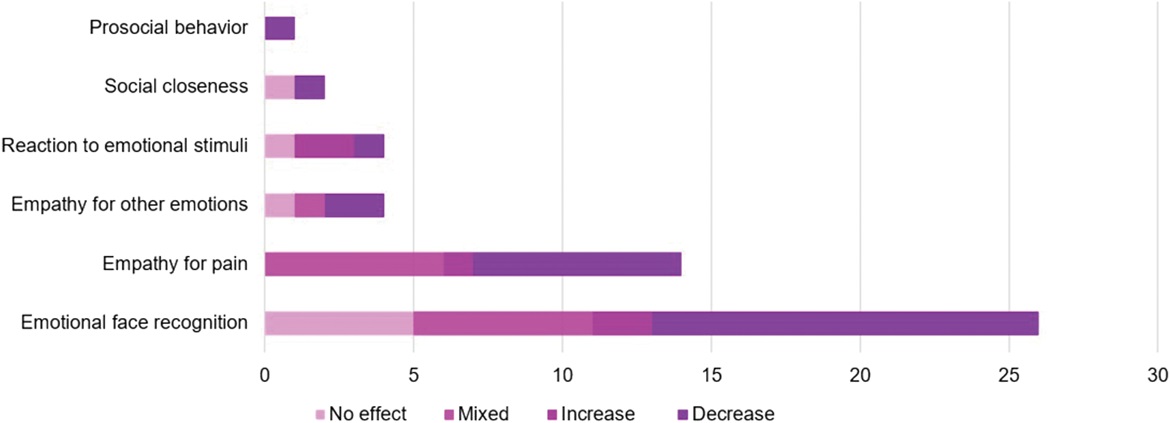
New publication: A systematic review on the effects of pain modulation on social emotions and behaviour

New podcast episode on the placebo effect
A new (German) podcast episode from the ERCM Medizin Podcast with Ulrike Bingel talks about the power of expectations, its neurobiological mechanisms, doctor-patient communication and the importance of trust in this relationship! Watch the full episode here.
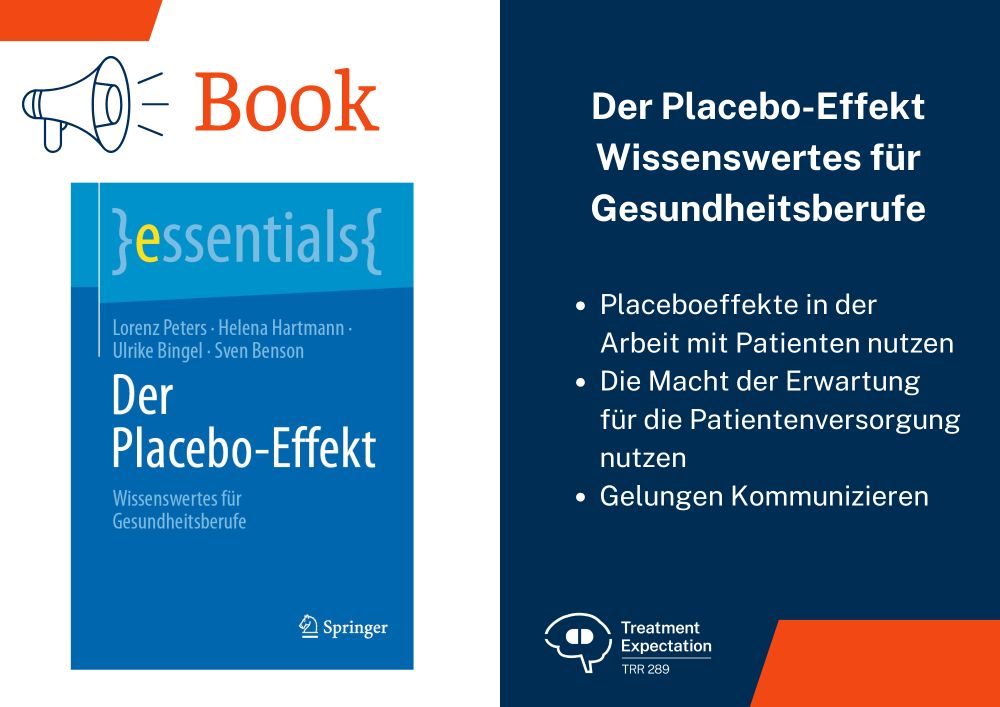
New Springer essentials book: The placebo effect explained for healthcare professionals
Today we have something about science communication! This new (German) book is aimed at healthcare professionals, so everyone working with or around patients: How can you use placebo effects when working with patients? How can you harness the power of expectation in patient care? How can you communicate successfully?
Order and read it here as a physical copy or ebook.
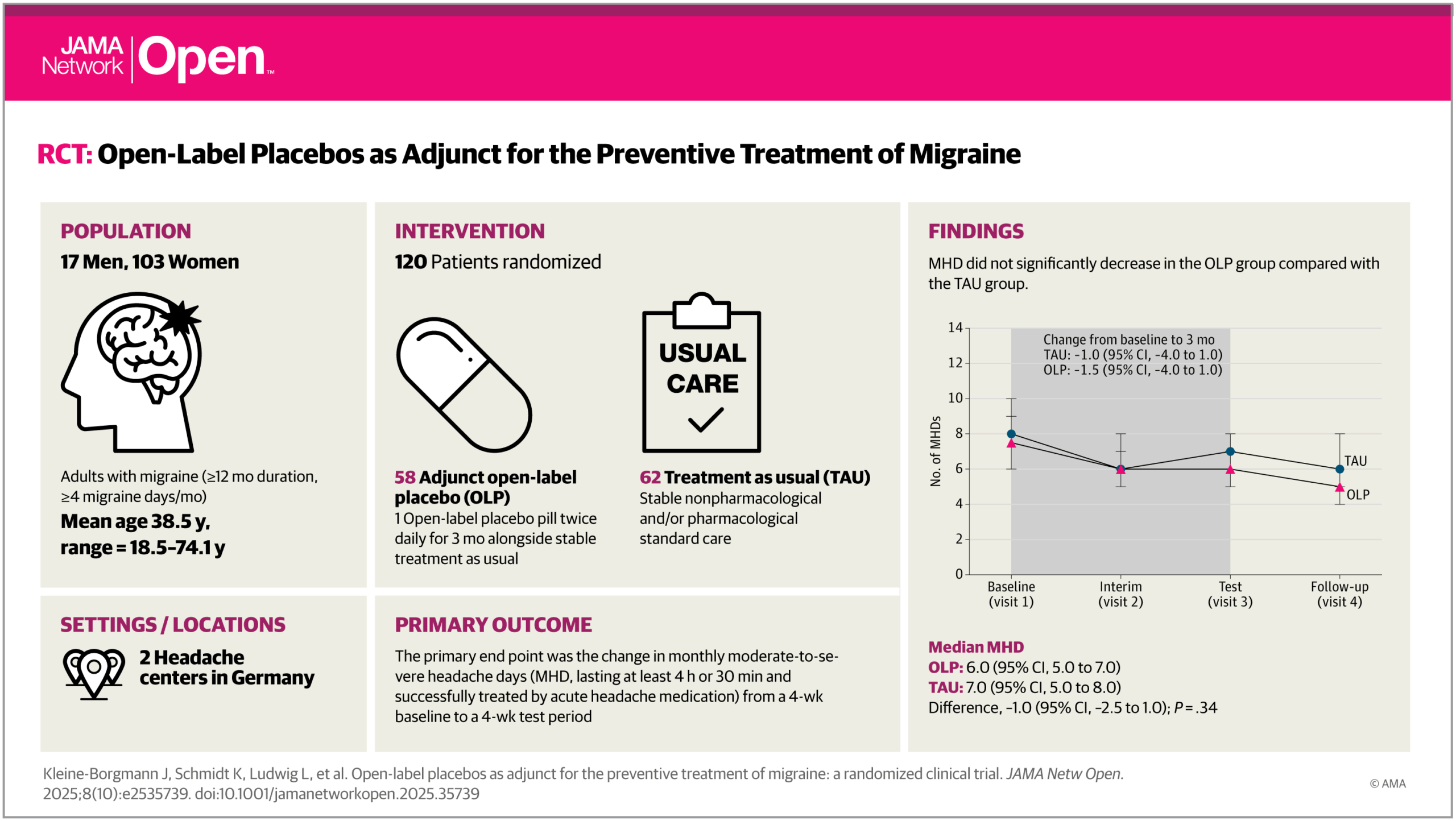
New publication: Open-label placebos as adjunct for migraine prevetion
A new study from our team, published in JAMA Network Open (October 2025), shows that open-label placebos (OLPs)—placebos honestly described as such—can meaningfully improve quality of life in people with migraine when added to standard preventive treatment. While OLPs did not reduce headache frequency, patients receiving OLPs reported less pain-related disability and felt significantly better overall. These findings, led by Julian Kleine-Borgmann and Katharina Schmidt, and conducted in collaboration with the Frankfurt Headache Center within the DFG-funded CRC 289 Treatment Expectation, suggest that OLPs may represent an ethical and safe add-on option to enhance patient-centered migraine care. Read the full article in JAMA Network Open.

New publication: Open-label placebos and academic test performance; a secondary analysis.
The study “The association between test anxiety, learning strategies, and open-label placebo effects on academic test performance” presents a secondary analysis of a randomized controlled trial. Elisa Frisaldi examined whether test anxiety and individual learning strategies moderate the effects of open-label placebos (OLPs) on academic performance. The results suggest that students with higher levels of test anxiety achieved better exam outcomes in the OLP group compared to the control group. Moreover, cognitive, metacognitive, and resource-related learning strategies appeared to interact with the placebo effect. The authors emphasize the need for further studies to confirm and extend these findings. Read the full publication
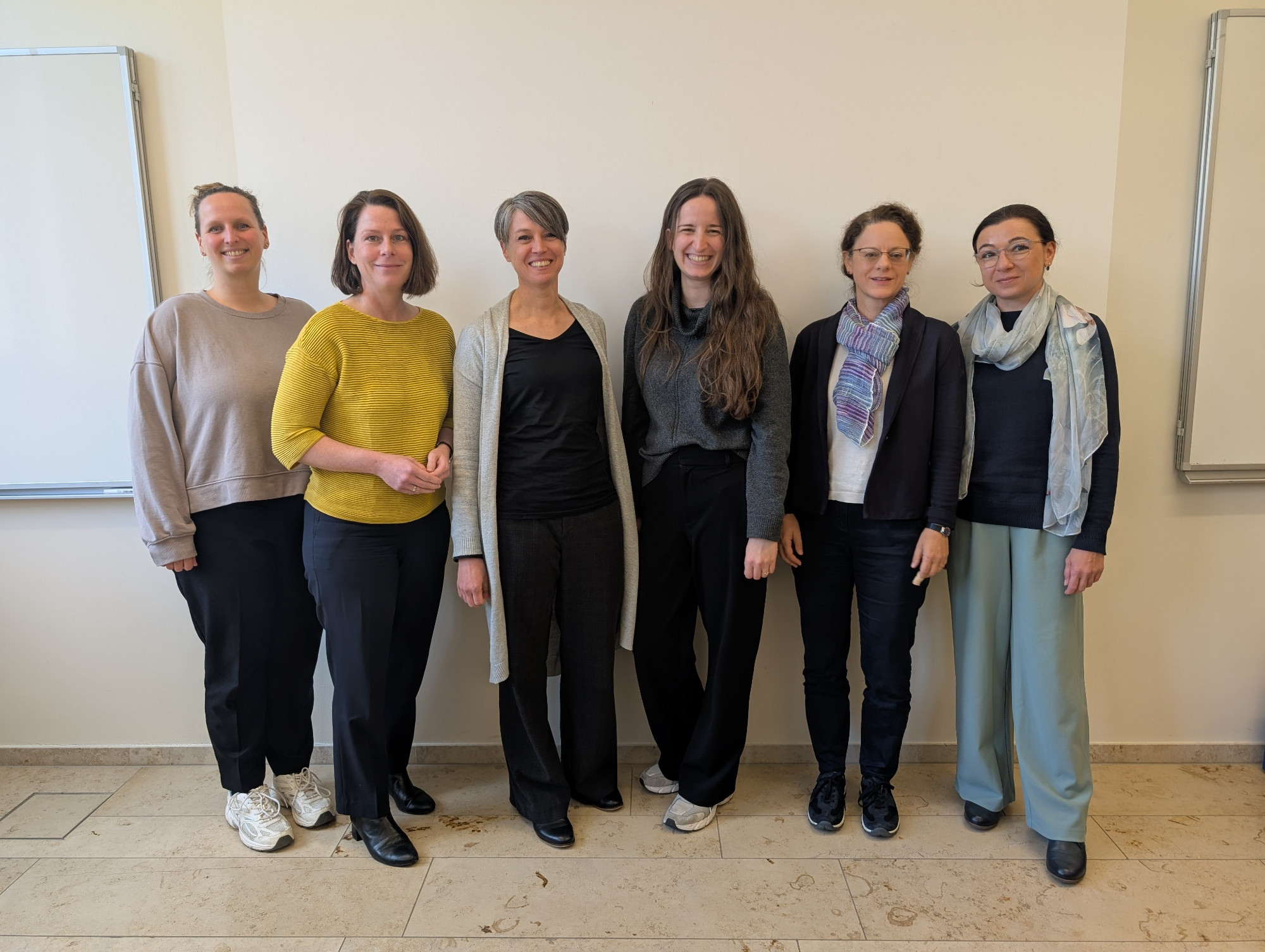
Visitors from Düsseldorf!
It was a great pleasure to have Susanne Becker and Lisa Garcia from Heinrich-Heine-University Düsseldorfin our group meeting today! There new data, planned studies, and a lot of time for discussions about shared interests and potential collaborations! More information on Susanne's research group can be found here.
In the picture from left to right: Katharina Schmidt, Ulrike Bingel, Susanne Becker, Lisa Garcia, Sigrid Elsenbruch, and Adriane Icenhour.
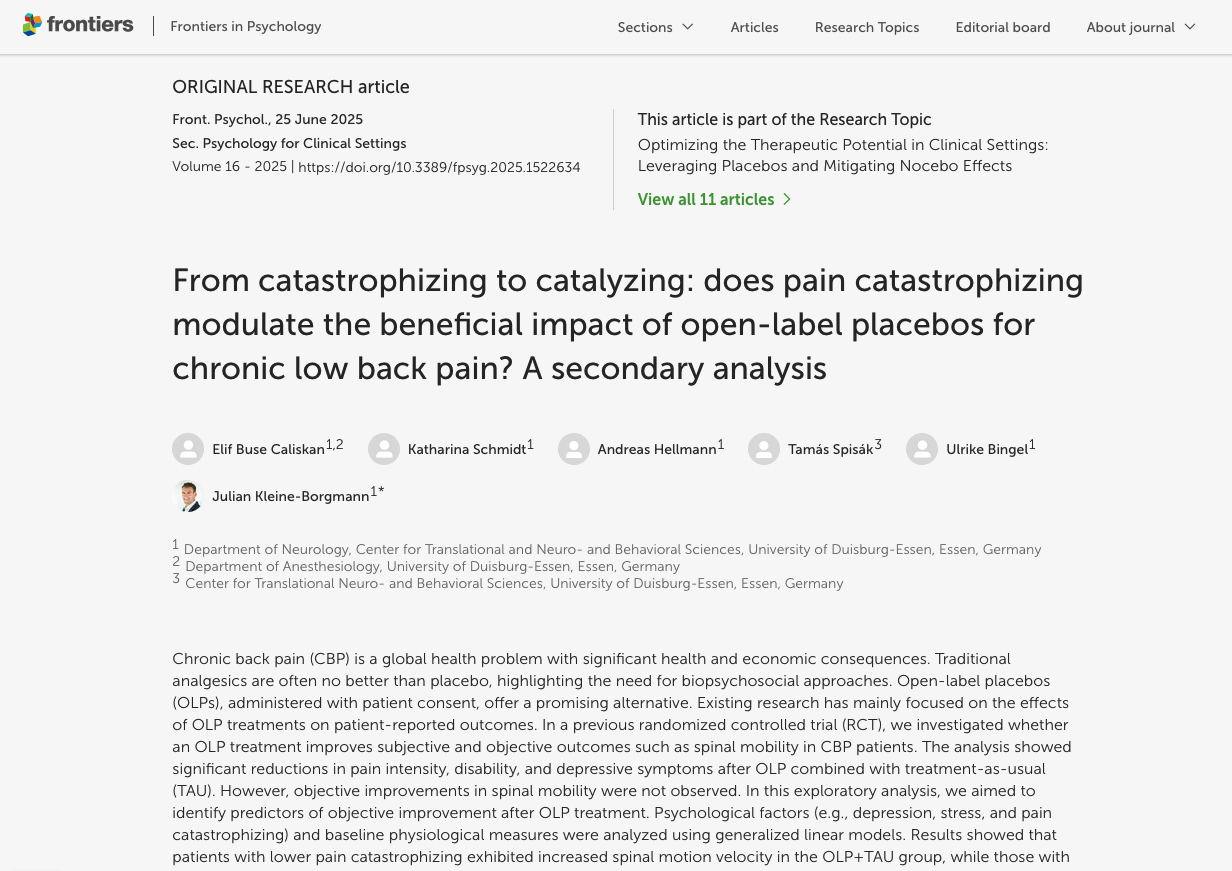
New Publication: Predictors of Objective Improvements After Open-Label Placebo in Chronic Back Pain
In a recently published exploratory analysis of our randomized controlled trial, Elif Caliskan and members of our team examined whether psychological and physiological factors predict objective improvements (spinal mobility) after OLP treatment combined with treatment-as-usual. The results indicate that patients with lower pain catastrophizing benefited most, showing increased spinal motion velocity, while those with higher catastrophizing did not. These findings highlight that OLPs may provide measurable benefits for specific patient subgroups, pointing toward the potential of personalized pain medicine. Further studies are needed to confirm these results and to better understand the role of psychological factors in chronic pain management. Read the full publication
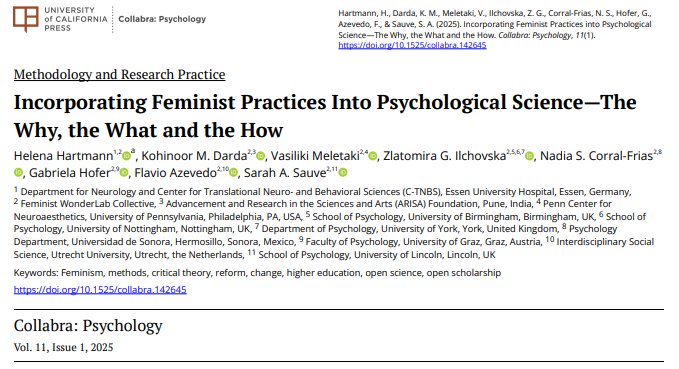
New publication in Collabra
A new perspective piece led by Helena Hartmann details the many ways in which we cna use feminist approaches in our own research. Feminism is about all forms of challenging social, economic and political power taken by a dominant group. Applying a feminist lens to scientific research can bring many advantages. The paper functions as an access point for (1) why researchers should incorporate feminist approaches in psychological science, (2) what feminist approaches could look like and (3) how researchers can start incorporating them into their own work. Find out more about the Feminist Wonder Lab and read the full article published in Collabra: Psychology.
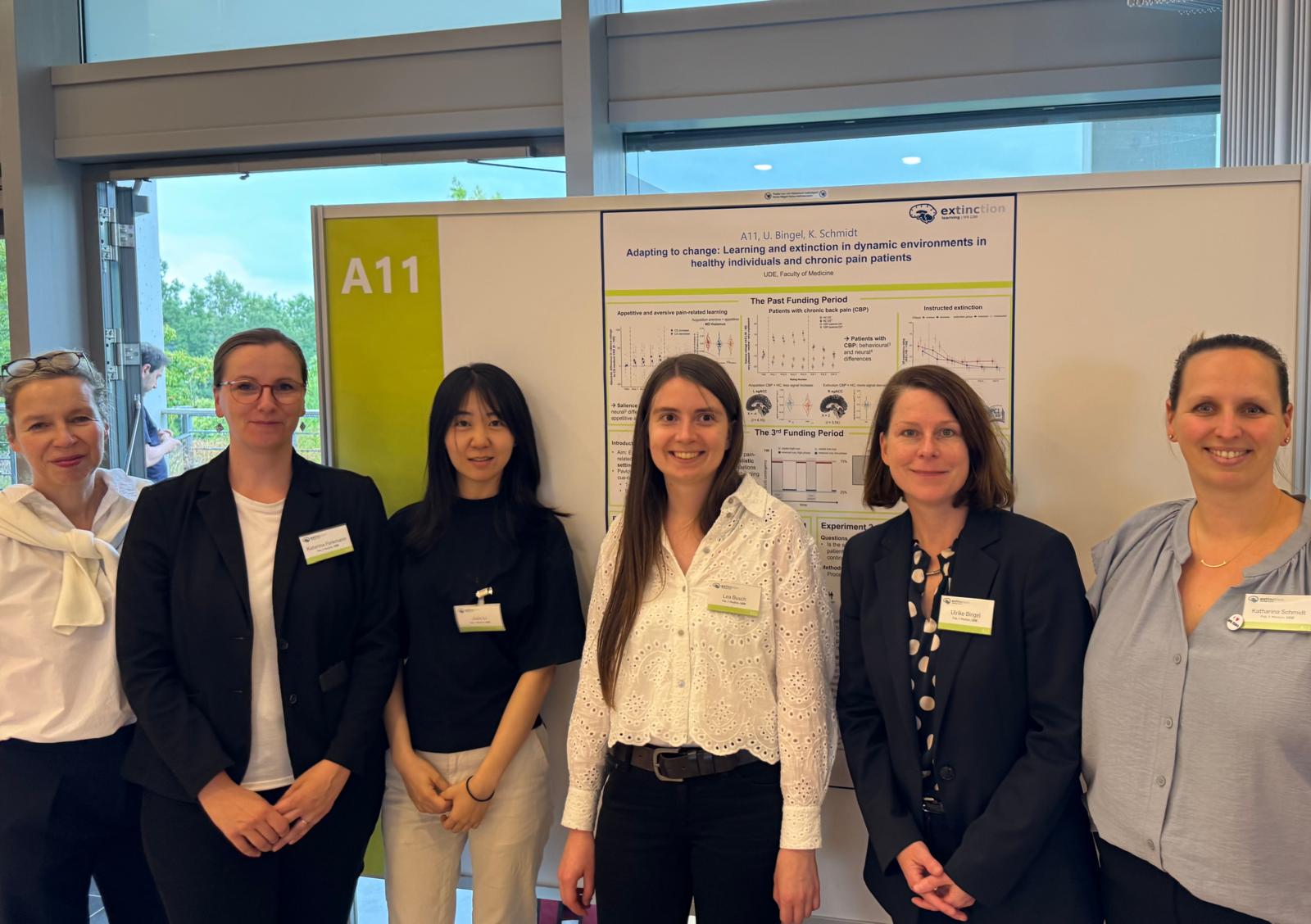
Successful CRC 1280 on-site review
After many rehearsals, yesterday some of our lab members participated in the on-site review for the third funding period of the Collaborative Research Center 1280. We represented project A11 which investigates the neural and behavioral mechanisms underlying the acquisition, extinction and reinstatement of pain-related fear in the context of somatic pain. The newly planned project for the third funding period will tackle learning and extinction in dynamic environments in healthy individuals and chronic pain patients. Now we have our fingers crossed until the DFG makes their final decision!
In the picture from left to right: Katja Wiech, Katarina Forkmann, Jialin Li, Lea Busch, Ulrike Bingel, & Katharina Schmidt
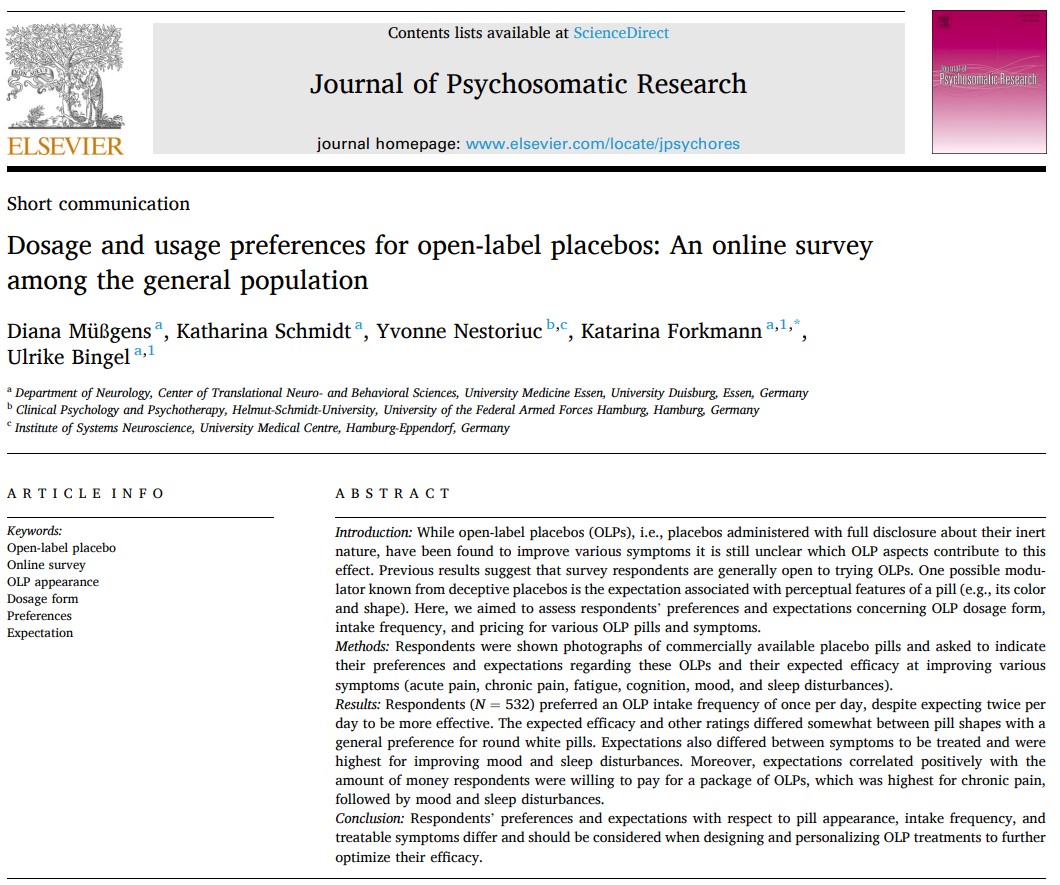
New publication in the Journal of Psychosomatic Research
This online study (n = 532) led by Diana Müssgens assessed preferences and expectations concerning open-label placebo (OLP) dosage form, intake frequency, and pricing. Round white pills were rated as most appealing, convincing, and effective. OLP pills were expected to be most effective for improving mood and sleep. Finally, people would pay most for OLPs intended to treat chronic pain, mood, and sleep. Want to know more? Read the full article here.

The Bingel Laboratory
Prof. Dr. med. Ulrike Bingel
Clinical Neurosciences
University Hospital Essen
Department of Neurology
Hufelandstraße 55
45147 Essen
Germany
Fon: +49 (0) 201 723 - 2446
Fax: +49 (0) 201 723 - 6882
Mail: ulrike.bingel@uk-essen.de
Copyright 2021 - Bingel Laboratory